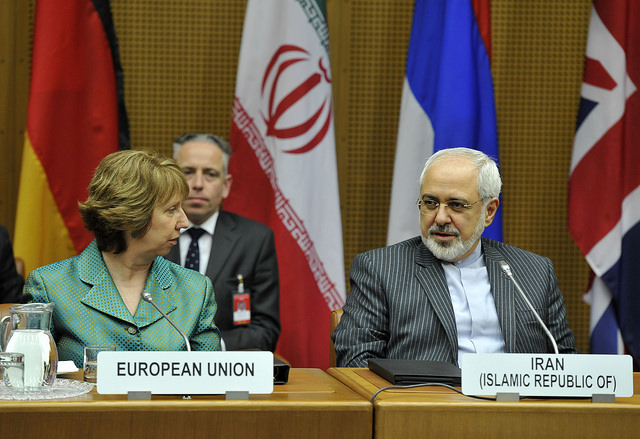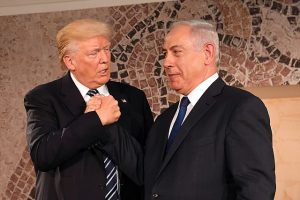by Peter Jenkins
What went wrong? Why were the United States and Iran unable to come to a comprehensive agreement in Vienna on Monday?
According to an Iranian source close to the negotiations, the main obstacle was the inability of the US negotiators to convince Iranian counterparts that the administration could persuade Congress to repeal relevant sanctions provisions.
Of course, the American negotiators offered executive waivers to exempt banks and exporters from US penalties for violating US sanctions legislation. But for the Iranian negotiators, a promise of waivers was not enough.
The Iranians reasoned—not unreasonably—that the promise of waivers could be ignored by President Barack Obama’s successor. They were well aware that European banks, some of which have been hit in recent years by gargantuan US fines, are unlikely to risk further such blows post-Obama by resuming normal business with Iran. On the contrary, non-US financial and trading companies are likely to be inhibited by the knowledge that this Damoclean sword, fashioned in the smithies of Capitol Hill, hangs over them.
This is but one explanation of why an agreement proved elusive on Monday. No doubt there are others. But this one rings true. It is certainly the case that European banks have become very wary of US sanctions provisions, and that they will not respond to the repeal of EU bilateral sanctions as Iran would wish while the threat of US penalties remains.
It is tempting to lament the lack of foresight of the first Obama administration. Their misguided belief that Iran could be coerced through sanctions into dismantling its uranium enrichment program led them to acquiesce to Congressional legislation that now stands between President Obama and the only achievement likely to stifle a hollow laugh, when future generations recall that he was awarded the Nobel Peace Prize in 2009.
But lamenting gets one nowhere. What’s needed is a solution to this problem—since, absent a solution, it looks unlikely that any number of extensions to the negotiation with Iran will lead to a comprehensive agreement.
I feel disabled by citizenship and ignorance from contributing anything more than a question. Could a concerted and determined European lobbying campaign help to sway enough senators into repealing or amending the problematic provisions?
The news that reaches my side of the Atlantic suggests the answer is “no.”
Congress has been in a highly partisan mood and is likely to remain so when it reassembles in January; so Senate Republicans are unlikely to be ready to facilitate a foreign policy success—even one that is in the US national interest.
If these days any country has a “special relationship” with the US, it is not the United Kingdom or other European nations; it is Israel. And we can all predict, based on his own public statements over the years, that Israel’s prime minister will fight tooth and claw to prevent the repeal of the legislation in question. Pitted against Israeli anxieties, and Congressional campaign funding considerations, Britain’s strategic loyalty to its US ally on many occasions, as well as cultural affinities, will count for very little.
Nonetheless, I hope it occurs to the US administration to encourage its European partners to bring to bear on the Senate whatever influence they have. It will be a disaster for US and EU interests in the Middle East if a vital nuclear non-proliferation policy founders on US sanctions legislation.
Is there no other aspect of the negotiation on which it could founder? My source suggests the Iranian side believes that the only other area in which significant problems remain is uranium enrichment. My source is confident, however, that these differences can be resolved if a solution can be found to the sanctions problem.
My own sense is that this optimism is not misplaced. I will explain why when I next write.






Question: has Lobe log now entered into censorship or is it just the person sitting on the review panel?
Considering the above, IMHO, it’s going to be Congress fault if there isn’t any final deal, not “O”‘s fault. After all, didn’t he start the present idea with a phone call? Perhaps it’s only delusional thinking on my part, that all this is/was part of “O”‘s legacy at the end of his presidency thinking/planning, hasn’t there been enough death and destruction in the M.E. as well as failure on the U.S. side of things? Out of control, perhaps is a better way to describe what has taken place since 9-11.
Two points:-
1. Much of the content of this article is speculative. It should have been delayed until the actual facts of the situation were established.
2. If US sanctions are the problem then the solution lies with EU banks and companies using only the euro for all future transactions. Drop the US dollar and the problem of sanctions becomes largely irrelevant.
This situation reaffirms the unwisdom of legislating in haste and repenting at leisure.
I agree with the author. There is a lot of uncertainties about the sanctions relief when the Republicans take over the Congress as Obama has not power to rescind the sanctions without the Congress approval.
Before accepting a deal, the Iranians want all encompassing guarantees that it will happen even after Obama is gone as they suspect that the Congress members manipulated by Israel will do all they can to sabotage the deal .
Yet a dramatic event affecting the USA where Iran cooperation is deemed necessary may force the Congress toward a deal. What event? It is clear that Islamist terrorism may play a role in shifting the Congress.
Is it a threat or the occurrence of a terrorist attack inside the USA that would emphasize the importance of collaborating with Iran’s in the fight against ISIS? Is it a terrorist attack inside Saudi Arabia or Jordan that will force the Congress to ask Iran for help?
Will the Congress made to realize that the only reliable force to fight against Sunni ISIS is not Israel or Turkey or the GCC , it is Iran. Not only Iran has one of the most trained and powerful army in the region but as it is a Shia country, it suffers of no ideological ambiguity in wanting the total destruction of Sunni ISIS.
I concur with the author, and much of Mr. Jenkins’ assertions here have been semi-corroborated by the speculations we have all been making for months leading up to this: that there are really two hurdles to an agreement, the first being those directly negotiating, and the second being Congress on the U.S. side and the Supreme Leader on the Iranian side. So this article speculates the first hurdle was passed but Iran wants guarantees that the second hurdle will be pass too before it commits. For Kerry to convince a Congress that considers itself accountable to “another authority” he needed to take a deal so good that the “other authority” could not refuse it. That offer would pretty much have had to be Iran’s total capitulation to the will of the “other authority”, namely, dismantling its nuclear program save a couple of face-saving tokens. And we all know that would have never happened.
What’s interesting though is how while the hardliners in both countries were expressing morbid skepticism before the deadline and flexing muscles, they both expressed great dismay that an agreement was not reached by that deadline. It is as though while they pretended otherwise they wanted a deal knowing it would not go to the extreme measures they each wanted. So that makes one wonder, was all of that tough talk before the deadline just posturing? Were the second hurdle parties in both countries just acting as the bad cops to the front line negotiators acting as the good cops? If so, now that it’s fairly clear where the final deal is going to look like, both second hurdle parties know the negotiators have not given away the store in the deal as they had feared, namely, the Senate is assured the sanctions will not be lifted right away, and the Supreme Leader is assured Iran will not dismantle its entire nuclear program. I suspect the deal as it stands is a 3 year period for the sanctions to be lifted, which is enough time to put it in the hands of the next president, and that’s a deal the Senate can live with. So, while I have complete faith in the stupidity of politicians that they don’t know a good deal when it falls on their lap, it’s Thanksgiving and the season’s good vibes put me in an optimistic mood that a deal will be struck some time before March. Why March and not end of this year? Because Kerry needs the new Senate to be in place so he can take his package to them and see if he can get their agreement that they would not torpedo the deal before he can go back to the table and sign the deal.